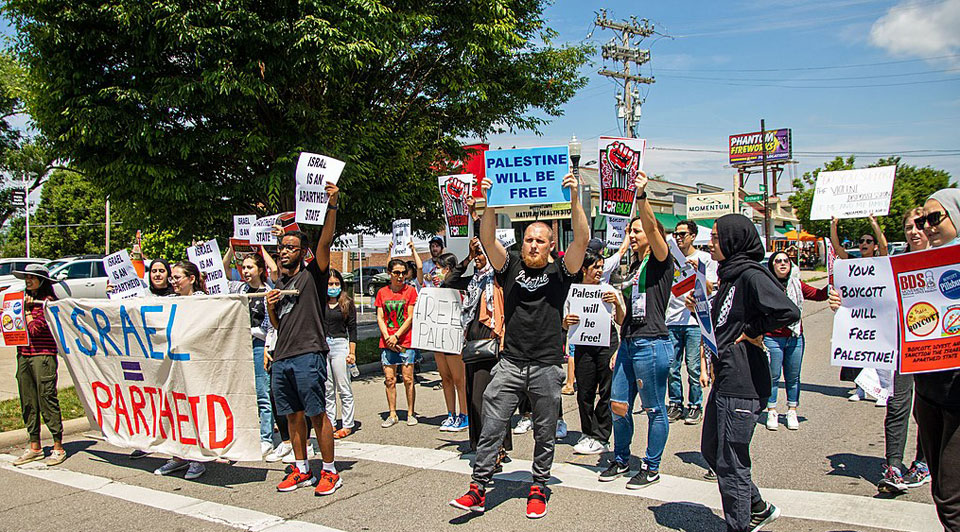February 8, 2022
BY RABBI BRANT ROSEN

Rally to boycott apartheid Israel, Columbus, Ohio, July 20, 2021

Rally to boycott apartheid Israel, Columbus, Ohio, July 20, 2021
Becker1999 (licensed under the Creative Commons Attribution 2.0 Generic license).
When Amnesty International announced the release of a 278 page report entitled “Israel’s Apartheid Against Palestinians,” you could already sense the storm clouds gathering. Even before it was actually released, the Israeli government publicly asked Amnesty to withdraw it, calling it “false, biased and antisemitic.” A group of six American Jewish organizations launched their own preemptive strike, claiming that the report was “unbalanced, inaccurate, and incomplete,” seeking only “to demonize and delegitimize the Jewish and democratic State of Israel.”
When the storm finally broke on February 2, it didn’t take long for the outrage to come raining down. U.S. politicians from both sides of the aisle issued fierce condemnations (DNC chairwoman Debbie Wasserman Schultz, called it “baseless,” “biased” and “steeped in antisemitism”). The Jewish institutional establishment likewise let loose: the Anti-Defamation League pronounced it “hateful,” “inaccurate” and “irresponsible”; the American Jewish Committee called the report “a canard” and a “libel”; and the Conference of Presidents of Major Jewish Organizations claimed the report sought “to demonize and delegitimize the Jewish and democratic State of Israel.”
The three major American Jewish religious denominations piled on as well: the Union for Reform Judaism expressed its “profound disappointment and explicit condemnation” of the report; the United Synagogue for Conservative Judaism labeled it “outrageously dishonest” and “deceitful”; and the Orthodox Union condemned the report as an “ideologically driven polemic.” (As of this writing, the Reconstructionist movement has yet to release a statement.)
It’s doubtful that the authors of these terse and hastily released statements actually read the report, which is nearly 300 pages and took four years to research and publish. And not surprisingly, none of the statements directly addressed the specific findings of the report beyond the use of the “A” word. Rather, they rolled out their tired and increasingly desperate-sounding pro-Israel talking points: that such claims “demonized” the state of Israel, that Israel is a thriving democracy that gives equal rights to its Palestinian citizens, and that criticism of Israel only serves to inflame antisemitism against Jews.
By contrast, statements from Liberal Zionist organizations were less harsh, admitting the reality of Israel’s human rights abuses even as they disagreed with the report’s use of the term “apartheid.” J Street threaded the needle very carefully, affirming that “Israel as a democratic national homeland for the Jewish people is historically just and necessary” while calling out Israel’s “deepening de facto annexation of the territory it has occupied since 1967.” When it came to the report itself, J Street declined to “endorse its findings or the recommendations.”
The response released by Tru’ah: The Rabbinical Call for Human Rights condemned “the very real human rights abuses that Palestinians face every day,” but objected to “many of the report’s assertions, language choices, assumptions, and conclusions.” (They remained notably silent on the specifics of their objections.) In the end, Tru’ah’s true agenda was revealed by their call for a negotiated settlement for a two-state solution: an argument for essentially maintaining the status quo even as Israel’s human rights abuses continue unabated on the ground.
It’s worth noting that while both Human Rights Watch and the Israeli human rights groups B’Tselem released similar reports on Israeli apartheid, neither inspired the same level of collective vehemence as the Amnesty report. This is likely because as one of the most prominent and well-known human rights organizations in the world, Amnesty’s report makes it that much more acceptable to isolate Israel as an apartheid state. Israel and its supporters know full well that a term such as this has the power to turn the state into an international pariah.
This report also differs from previous reports in terms of its conclusions, particularly its explicit support of Palestinian refugees’ right of return. And while Amnesty does not openly support BDS [Boycott, Divestment, Sanctions], it does call on governments and regional actors to “immediately suspend the direct and indirect supply, sale or transfer, including transit and trans-shipment to Israel of all weapons, munitions and other military and security equipment, including the provision of training and other military and security assistance.” It likewise encourages them to “institute and enforce a ban on products from Israeli settlements in (their) markets” and “regulate companies domiciled in (their) jurisdiction in a manner to prohibit companies’ operation in settlements or trade in settlements goods.”
In the end, human rights reports alone cannot themselves hold Israel accountable. They can, however, create space to make it more acceptable to publicly acknowledge the systemic roots of Israel’s crimes against Palestinians. As journalist Maureen Murphy wrote in her excellent piece What Makes Amnesty’s Apartheid Report Different?: “Amnesty’s report is a strong indicator that an analysis beyond the 1967 occupation of the West Bank and Gaza is becoming mainstream.”
In the meantime, I hope that anyone concerned with justice in Israel/Palestine will do what the organizations above cynically failed to do: read, consider, discuss and share the content of this important and groundbreaking report.
The author has granted permission for reposting in People’s World. The original post can be viewed here.
CONTRIBUTOR

Rabbi Brant Rosen
Brant Rosen is Midwest Regional Director for the American Friends Service Committee and the rabbi of Tzedek Chicago.
When Amnesty International announced the release of a 278 page report entitled “Israel’s Apartheid Against Palestinians,” you could already sense the storm clouds gathering. Even before it was actually released, the Israeli government publicly asked Amnesty to withdraw it, calling it “false, biased and antisemitic.” A group of six American Jewish organizations launched their own preemptive strike, claiming that the report was “unbalanced, inaccurate, and incomplete,” seeking only “to demonize and delegitimize the Jewish and democratic State of Israel.”
When the storm finally broke on February 2, it didn’t take long for the outrage to come raining down. U.S. politicians from both sides of the aisle issued fierce condemnations (DNC chairwoman Debbie Wasserman Schultz, called it “baseless,” “biased” and “steeped in antisemitism”). The Jewish institutional establishment likewise let loose: the Anti-Defamation League pronounced it “hateful,” “inaccurate” and “irresponsible”; the American Jewish Committee called the report “a canard” and a “libel”; and the Conference of Presidents of Major Jewish Organizations claimed the report sought “to demonize and delegitimize the Jewish and democratic State of Israel.”
The three major American Jewish religious denominations piled on as well: the Union for Reform Judaism expressed its “profound disappointment and explicit condemnation” of the report; the United Synagogue for Conservative Judaism labeled it “outrageously dishonest” and “deceitful”; and the Orthodox Union condemned the report as an “ideologically driven polemic.” (As of this writing, the Reconstructionist movement has yet to release a statement.)
It’s doubtful that the authors of these terse and hastily released statements actually read the report, which is nearly 300 pages and took four years to research and publish. And not surprisingly, none of the statements directly addressed the specific findings of the report beyond the use of the “A” word. Rather, they rolled out their tired and increasingly desperate-sounding pro-Israel talking points: that such claims “demonized” the state of Israel, that Israel is a thriving democracy that gives equal rights to its Palestinian citizens, and that criticism of Israel only serves to inflame antisemitism against Jews.
By contrast, statements from Liberal Zionist organizations were less harsh, admitting the reality of Israel’s human rights abuses even as they disagreed with the report’s use of the term “apartheid.” J Street threaded the needle very carefully, affirming that “Israel as a democratic national homeland for the Jewish people is historically just and necessary” while calling out Israel’s “deepening de facto annexation of the territory it has occupied since 1967.” When it came to the report itself, J Street declined to “endorse its findings or the recommendations.”
The response released by Tru’ah: The Rabbinical Call for Human Rights condemned “the very real human rights abuses that Palestinians face every day,” but objected to “many of the report’s assertions, language choices, assumptions, and conclusions.” (They remained notably silent on the specifics of their objections.) In the end, Tru’ah’s true agenda was revealed by their call for a negotiated settlement for a two-state solution: an argument for essentially maintaining the status quo even as Israel’s human rights abuses continue unabated on the ground.
It’s worth noting that while both Human Rights Watch and the Israeli human rights groups B’Tselem released similar reports on Israeli apartheid, neither inspired the same level of collective vehemence as the Amnesty report. This is likely because as one of the most prominent and well-known human rights organizations in the world, Amnesty’s report makes it that much more acceptable to isolate Israel as an apartheid state. Israel and its supporters know full well that a term such as this has the power to turn the state into an international pariah.
This report also differs from previous reports in terms of its conclusions, particularly its explicit support of Palestinian refugees’ right of return. And while Amnesty does not openly support BDS [Boycott, Divestment, Sanctions], it does call on governments and regional actors to “immediately suspend the direct and indirect supply, sale or transfer, including transit and trans-shipment to Israel of all weapons, munitions and other military and security equipment, including the provision of training and other military and security assistance.” It likewise encourages them to “institute and enforce a ban on products from Israeli settlements in (their) markets” and “regulate companies domiciled in (their) jurisdiction in a manner to prohibit companies’ operation in settlements or trade in settlements goods.”
In the end, human rights reports alone cannot themselves hold Israel accountable. They can, however, create space to make it more acceptable to publicly acknowledge the systemic roots of Israel’s crimes against Palestinians. As journalist Maureen Murphy wrote in her excellent piece What Makes Amnesty’s Apartheid Report Different?: “Amnesty’s report is a strong indicator that an analysis beyond the 1967 occupation of the West Bank and Gaza is becoming mainstream.”
In the meantime, I hope that anyone concerned with justice in Israel/Palestine will do what the organizations above cynically failed to do: read, consider, discuss and share the content of this important and groundbreaking report.
The author has granted permission for reposting in People’s World. The original post can be viewed here.
CONTRIBUTOR

Rabbi Brant Rosen
Brant Rosen is Midwest Regional Director for the American Friends Service Committee and the rabbi of Tzedek Chicago.
No comments:
Post a Comment